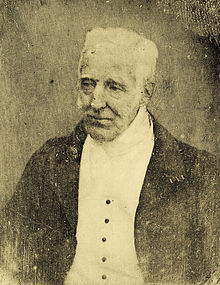Arthur Wellesley, 1st Duke of Wellington
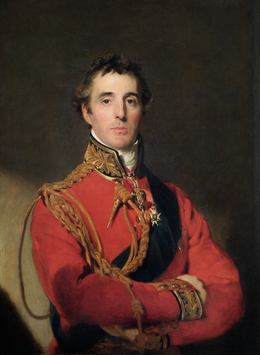
Arthur Wellesley, 1st Duke of Wellington (* probably May 1, 1769 in Dublin , Ireland ; † September 14, 1852 in Walmer Castle near Deal , Kent , England ), was Field Marshal and the most outstanding British military leader of the Napoleonic period as well as British foreign and twice prime minister . He was victorious over Napoleon in the battle of Waterloo .
Life
Origin and childhood
Wellesley was of Anglo-Irish nobility and was the third surviving son of Garret Wesley, 1st Earl of Mornington and Anne, daughter of Arthur Hill-Trevor, 1st Viscount Dungannon . The date of his birth is not known for certain. Presumably he was born at Mornington House , 24 Upper Merrion Street , Dublin . His older brother Richard Colley Wellesley (1760-1842) succeeded his father as Earl of Mornington and in 1799 was raised to Marquess Wellesley .
As a child sickly and not very ambitious, but musically gifted (he liked to play the violin and often), he was completely in the shadow of his two older brothers. After attending Eton College from 1781 to 1785, where he did not excel, his parents first sent him to the 73rd Infantry Regiment of the British Army , where he joined on March 7, 1787. Then he attended the military academy in Angers (France).
Military career
In 1788, Wellesley was promoted to lieutenant. After a few stops with the cavalry and the 12th and 18th light dragoons, he became a lieutenant colonel in the 33rd Regiment of Foot in 1793 , a rapid rise made possible by the then common purchasing system . During the whole time he was adjutant to the Viceroy of Ireland and from 1790 to 1797 MP for the constituency of Trim in County Meath (his family seat) in the House of Commons of the Irish Parliament .
His active military career began in 1794 when he went to Flanders in the First Coalition War with the Duke of York and Albany and took part in the unsuccessful campaign against the French. He commanded the rear guard on the retreat.
In 1796 Wellesley was promoted to colonel and went with his regiment to British India , where his older brother Richard was to become Governor General the following year . When the Fourth Mysore War against the Sultan of Mysore , Tipu Sultan , broke out in 1799 , he commanded his first division . In 1803 he led a very successful campaign in the Second Marath War and was able to significantly expand his military skills. He became Commander in Chief of the British Armed Forces in India and forced all of South India under British rule. On August 11, 1803 he took the fortress Ahmednagar and defeated a superior force of the Marathas in the Battle of Assaye . In the next few weeks his troops managed to capture Burhanpur and the Asirgarh fortress. He advanced on Hyderabad , won the battle of Argaon on November 29th and stormed the fortress of Gawilgarh . In recognition of his achievements, he was in 1804 as a Knight Companion of the Order of the Bath to beat Knight and returned in 1805 as a Major General Sir Arthur Wellesley back to the UK, together with Richard, whose term had also expired as Governor General.
In 1807 Wellesley took part in an expedition to Denmark as a lieutenant general. At the beginning of August 1808 he landed with 13,000 men in Portugal and two weeks later defeated the French troops in the battle of Vimeiro . Wellesley's superiors Burrard and Dalrymple , who had only arrived in Portugal after the end of the battle, signed the Cintra Convention at the end of August , which not only allowed the French to travel freely, but also to receive the spoils of war and to transport them back on British ships guaranteed. These conditions were seen by the British public as a victory for France; Wellesley, Burrard and Dalrymple were ordered back to Britain and heard in a military tribunal. Wellesley was exonerated and, unlike the other two involved, rehabilitated. On October 27, 1807, France and Spain secretly agreed in the Treaty of Fontainebleau (1807) the conquest and partition of Portugal. Spain allowed the French troops to march through Spanish territory.
In the spring of 1809 the French tried a second time to conquer Portugal. Wellesley returned to Portugal and took over command of the British-Portuguese troops there. On May 12, 1809, he defeated Marshal Nicolas Soult in the Second Battle of Oporto . Wellesley put an end to French ambitions by winning the Battle of Talavera de la Reina on July 28th. In recognition of his achievements, he was raised to peer on September 4, 1809 with the hereditary titles Viscount Wellington and Baron Douro .
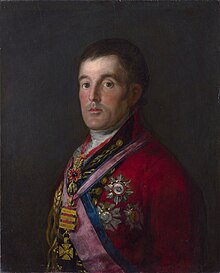
Wellesley commissioned the fortification of the Torres Vedras lines from the British engineer Richard Fletcher on October 20, 1809 , under whose direction they were built by Portuguese workers and soldiers. The advance of the French under Marshal Masséna suffered a serious setback on September 27, 1810 at the Battle of Buçaco , but the capital Lisbon remained threatened. On April 3, 1811, France's last attempt to conquer Portugal failed with the Battle of Sabugal . Then the mood in Spain swung to the British side; Wellesley also became supreme commander of the Spanish armed forces. Lord Beresford was given supreme command of the reorganized Portuguese armed forces. After it became known that the French troops in western Spain were reduced, marched Wellington to Ciudad Rodrigo and took the city after a short siege on 19 January 1812, for which he by the Prince Regent George on February 28, 1812 to the Earl of Wellington was raised . From March 27, 1812, the allies began the third siege of Badajoz , Wellington took the city after three weeks with the loss of about 4,000 men on the British side on April 7th. The conquest allowed the British to launch their own operations in central Spain. While a British corps advanced under General Hill between the French armies Marmont and Soult in the direction of the Tagus , the main British power turned to León . On July 21st the French awaited the enemy at the Tormes and in positions on the Arapiles and on July 22nd Wellington defeated them at the Battle of Salamanca . As a result of these fighting, Wellington was able to occupy Madrid on August 12 , but was driven out of the city shortly afterwards and had to give up the planned siege of Burgos . On October 4, 1812 he was bestowed the hereditary title Marquess of Wellington .
After Napoleon's defeat in Russia and the beginning of the fighting in Germany, the French troops in Spain received no more reinforcements. Wellington spent the winter reorganizing his army and planned to fight the Iberian Peninsula entirely free in the spring of 1813. In May 1813, Wellington's final offensive began from Portugal between the Duero and Tajo , in which he first conquered the northern provinces of Spain and moved his headquarters from Lisbon to Santander . Wellington's troops marched through the Castilian highlands towards Cantabria to force the main French power to withdraw from central Spain by cutting off communications. He attacked the main French power under Joseph Bonaparte on June 21, 1813 in the decisive battle of Vitoria with three columns. The battle ended Napoleon's rule in Spain. On July 7th, Wellington began the siege of San Sebastian . In the autumn of 1813 he, meanwhile promoted to field marshal , wrestled with the troops of the new French commander-in-chief Soult on a broad front for the crossings in the Pyrenees . Invading southern France, he and Soult fought in the bloody battle of Toulouse on April 10, 1814 , and then the war ended with Napoleon's abdication.
On May 11, 1814, the Prince Regent awarded on behalf of his father Georg III. him the hereditary titles Duke of Wellington and Marquess Douro .
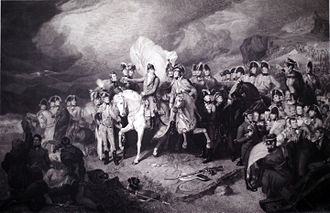
In the spring of 1815, the Duke took part in several sessions of the Congress of Vienna under Lord Castlereagh . In February, Wellington was after his recall to England, chief plenipotentiary in Vienna, before he received the supreme command in the new war against France after Napoleon's return from Elba in March 1815. In the Brussels area , Wellington gathered the allied army against Napoleon, including only about 35,000 British, and waited for the planned union with the Prussians. Attacked by Napoleon on June 18 in the Battle of Waterloo (also known as the "Battle of Belle Alliance"), Wellington's troops successfully withstood the French attacks until the arrival of the Prussians decided the victory of the Allies. The well-known quote "I wish it was night or the Prussians would come" is attributed to Wellesley while waiting for Blucher to arrive , but it is not guaranteed. With the help of Blucher, the battle ended in Wellesley's favor, Napoleon withdrew defeated, and for him this battle meant the end of his military career. Wellington, on the other hand, was hailed as a hero by the British, and from then on he was considered a master of the defensive among military strategists .
Wellesley was Commander in Chief of the British Army in 1827/28 and again from 1842 until his death. From 1829 he also held the office of Lord Warden of the Cinque Ports . After his death, he was buried in a state funeral in the crypt of St Paul's Cathedral on November 18, 1852 . In the main nave of the cathedral, a monumental grave was erected for him.
Political life
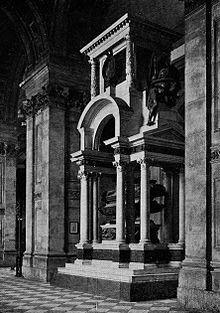
In 1806 he moved to the British House of Commons as an MP for the Rye constituency in Sussex . In Parliament he was a member of the Tories . In 1807 he became Chief Secretary for Ireland , but that office he gave up in the same year in favor of his military career. In 1807 he was a brief member of parliament for the constituencies of Tralee in County Kerry and Mitchell in Cornwall, Ireland and was then a member of parliament for the Newport constituency on the Isle of Wight from 1807 to 1809 . When he was made a peer in 1809, he became a member of the British House of Lords for life , leaving the House of Commons for it.
After the Congress of Vienna he turned back to a political career and in 1818 received an office in the Tory government under Lord Liverpool . On August 17, 1827, he became Commander-in-Chief of the British Army, but reluctantly took over the post of Prime Minister in 1828 after the death of Canning and the overthrow of Lord Goderich . He led an ultra-conservative government and an isolationist policy. Despite the victory in the Battle of Navarino, he ended the support of the Greek struggle for freedom . As a result of this policy, Prince Leopold refused the Greek crown offered to him. Domestically, Wellington enforced the right to vote for Catholics in 1829 against great internal party opposition . At the same time he tried to prevent further electoral reform, which is why he became extremely unpopular with large parts of the population. The delay in electoral reform and its unpopularity turned into riot. Nevertheless, he declared in complete misunderstanding of the situation at the opening of parliament after the death of George IV, that he still rejects an electoral reform. This declaration led to the overthrow of his government on November 22nd, 1830. His successor as Prime Minister Earl Gray immediately set about reforming the electoral system and on March 1, 1831, against Wellington's opposition, introduced the Reform Act into the House of Commons. After the law passed the House of Commons, the House of Lords refused to give its approval on October 8, 1831. Despite the threat of an impending revolutionary overthrow, the House of Lords continued to block the law. On May 9, 1832, Wellington was reappointed head of government. Wilhelm IV moved him to form a moderate cabinet. As numerous savers withdrew their deposits from the Bank of England in protest , a financial crisis threatened, so that Wellington gave up again on May 15th. His successor was again Earl Gray, under whom the electoral reform of the House of Lords passed on June 4, 1832.
Wellington spent the next two years in opposition. At the memorial service for Lord Althorp in the House of Lords, William IV unexpectedly dismissed the Whig cabinet and commissioned Wellington on November 17, 1834 with the formation of a minority government. He eventually proposed Robert Peel , his longtime political companion, as Prime Minister while he was taking on the post of Foreign Minister. This was the last British government to be appointed by a monarch without a majority in the House of Commons, and it failed in April 1835. Peel was reappointed Prime Minister in September 1841, and Wellington was appointed Commander-in-Chief of the Army Ministers without Portfolio and Leader of the House of Lords . When Peel resigned in 1846, Wellington resigned as leader of the majority faction on June 27 and withdrew from the public. However, he retained the post of Commander-in-Chief of the Army until his death.
Private life
On April 10, 1806 he married Kitty Pakenham , the daughter of the 2nd Baron Longford . The following children were born from the marriage:
- Arthur Wellesley, 2nd Duke of Wellington (1807-1884), British Lieutenant General and politician;
- Lord Charles Wellesley (1808-1858), British major general and politician.
Kitty's brother Ned was one of Wellington's most important generals in Spain. Wellington had been a member of the Freemasonry Association ( Trim No. 494 ) since December 7, 1790 and belonged to the renowned London Travelers Club .
honors and awards
He was Knight Companion of the Order of the Bath since 1804 and was elevated to the Knight Grand Cross of this order when the statutes were reformed in 1815 . In 1813 he was a Knight Companion in the Order of the Garter was added and in 1816 the Grand Cross Knight of the Guelph-Order beaten. In 1807 he was admitted to the Privy Council and in 1847 made a Fellow of the Royal Society .
For his services he was also awarded nobility titles by allied foreign monarchs, for example in Portugal in 1811 he was made Conde do Vimeiro and in 1812 Duque de Vitória and Marquês de Torres Vedras , in Spain in 1812 Duque de Ciudad Rodrigo and in the Netherlands in 1815 Prins van Waterloo .
The HMS Duke of Wellington , a 131-gun ship of the British Royal Navy , was named after him in 1852. She was the flagship of Sir Charles Napier , then Rear Admiral of the Blue Flag . The HMS Iron Duke , the flagship of the Grand Fleet in World War I, was also named after him.
Trivia
- Wellington's favored design of the Hessian military boots was used for the first British rubber boots , which is why they are called Wellington boots or Wellingtons in Great Britain .
- The New Zealand capital Wellington and the city of Wellington in South Africa are named after him .
- The newly created Dukedom was named after the town of Wellington , Somerset . The Wellington Monument stands there on Wellington Hill .
- The Beef Wellington , a wrapped with puff pastry beef, was named in his honor.
- As Prime Minister, his rejection of the electoral reform made him so unpopular that he had to provide his London townhouse Apsley House with iron window shades so that the angry mob would not break the windows and which is why he was nicknamed Iron Duke . This moniker has already been used three times for Royal Navy warships and was also used in the Perry-Rhodan series.
- The horse from Wellington, Copenhagen was famous . There are several equestrian monuments of the duke that show him riding on Copenhagen.
- In 2012 the film Lines of Wellington was released , in which the story of Wellington's lines by Torres Vedras is presented. Wellington's actor was John Malkovich .
- It can be seen on the back of a £ 5 banknote.
- In 2002 he was voted 15th of the top 100 British in a poll by the BBC .
- Ludwig van Beethoven dedicated the song Wellingtons Sieg to him
Quotes
- “Write the story of a battle? You might as well want to write the story of a ball night. "
- "The greatest misfortune is a lost battle, the second greatest one won."
- "Nothing but a lost battle can be half as melancholy as a won battle."
- "History is the fable or lie that has been agreed upon."
- “I don't know any woman who died of lovesickness. They all cope with it with little difficulty and still look adorable. "
- "Don't put off until tomorrow what you can do today, because if you enjoy it today, you can repeat it tomorrow."
- "Experience is the sum of the mistakes that one has made."
- "Happiness is for efficiency."
- "I wish it would be night or the Prussians would come." - Unconfirmed quote.
- "That does not work like this. Let's write a victory for ourselves. "
literature
- Michael Glover: Wellington as Military Commander . Sphere Books, London 1973, ISBN 0-7221-3903-9 .
- Richard Holmes: Wellington. The Iron Duke . HarperCollins, London 2003, ISBN 0-0071-3748-6 .
- John Keegan : The General's Mask . Quadriga, Berlin 2000, ISBN 3-88679-283-8 .
- Elizabeth Longford: Wellington . Weidenfeld and Nicolson, London 1992, ISBN 0-297-81273-4 .
Web links
- Literature by and about Arthur Wellesley, 1st Duke of Wellington in the catalog of the German National Library
- Field Marshal Arthur Wellesley, 1st Duke of Wellington on thepeerage.com
- Number 10: Duke of Wellington
- bbc History: Duke of Wellington
Individual evidence
- ^ The London Gazette , May 3, 1814, no.16984, p. 936 .
- ^ Wilhelm Liebknecht : Karl Marx for memory . In: Mohr and General. Memories of Marx and Engels . Dietz Verlag, Berlin 1965, p. 122.
- ↑ MQ Magazine by Yasha Beresiner (April 9, 2004). Retrieved May 21, 2014
- ↑ bbc History: Duke of Wellington. Retrieved January 20, 2012 .
- ↑ to General Beresford after the undecided battle at Albuera, who had considered the battle lost
| predecessor | Office | successor |
|---|---|---|
| New title created |
Viscount Wellington 1809-1852 |
Arthur Wellesley |
| New title created |
Earl of Wellington 1812-1852 |
Arthur Wellesley |
| New title created |
Marquess of Wellington 1812-1852 |
Arthur Wellesley |
| New title created |
Duke of Wellington 1814-1852 |
Arthur Wellesley |
| Prince Frederick, Duke of York and Albany |
Commander in Chief of the British Army 1827–1828 |
Rowland Hill, 1st Viscount Hill |
| Rowland Hill, 1st Viscount Hill |
Commander in Chief of the British Army 1842-1852 |
Henry Hardinge, 1st Viscount Hardinge |
| personal data | |
|---|---|
| SURNAME | Wellesley, Arthur, 1st Duke of Wellington |
| ALTERNATIVE NAMES | Wellesley, Arthur; Wesley, Arthur |
| BRIEF DESCRIPTION | British Field Marshal and Politician, Member of the House of Commons |
| DATE OF BIRTH | April 30, 1769 or May 1, 1769 |
| PLACE OF BIRTH | Dublin , Ireland |
| DATE OF DEATH | September 14, 1852 |
| Place of death | Walmer Castle at Deal , Kent , England |


